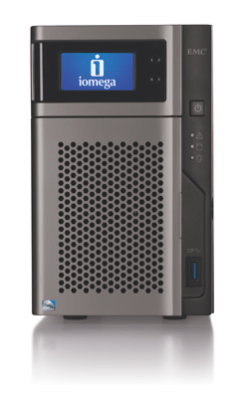Short Version
While there is plenty to be said for cloud storage, sometimes it’s nice to have a few terabytes on your local network for backups, document storage, and fun. That said, the Iomega StorCenter px2-300d NAS drive performs all of the functions of a small NAS admirably and, with a bit of tweaking, can become a very usable system for remote access of your files on the road.
Features:
- Multi-protocol support
- Secure accounts
- Front LCD screen
- Full Linux server built-in
- MSRP: Diskless $499, 2TB $699 (Product Page)
Pros:
- Intuitive interface
- Easy set up
- Built-in antivirus
Cons:
- A little daunting for beginners
- Cloud connectivity is difficult to finagle
- Some features are hard to use
It’s hard out there for a NAS. You get no respect, you’re ignored most of the time, and people dump files onto you without using your whole feature set. Luckily, NAS devices are getting easier and easier to use and new devices like the StorCenter px2-300d are actually more like mini computers than dumb hard drives on the network.
The $699 2TB model I tested can be used in two ways. If you’re in a hurry you can easily drop the drive on your network and begin copying files to it. It supports Time Machine backups as well as a number of backup solutions including Atmos, Avamar, and a scripted copy job system that will grab files at certain intervals. DLNA support ensures that your drive pops up on media devices around the house and you can even use the drive as a DVR by connecting webcams to the Axis or Securemind Surveillance systems.
Once you really dig into the drive, however, beginning users will be stymied. Remote file access, for example, requires a quick trip to your router’s port forwarding settings, a visit that could turn many users off. The company offers an app called Storage Manager to connect to distant drives and if you’re comfortable with port forwarding it works quite well. If you’re less than comfortable, however, you may want to stick with Pogoplug-compatible devices like Buffalo’s CloudStor solutions. To be clear, Iomega makes it very simple to set up cloud access but it’s just wonky enough that beginning users may not enjoy it.
Once you get past those configuration problems, however, the drive is smooth sailing. IT managers will enjoy the built-in anti-virus scanning as well as the system status data that tells you if the drive is healthy. A full logging system ensures you can see comings and goings on the drive and the entire thing is lightning fast thanks to a built-in 1.8Ghz processor and 2GB of memory. A built-in QuickTransfer feature allows you to plug in a USB thumb drive and automatically suck all of the contents to a certain folder while fans of FTP will enjoy the built-in FTP server. The drive even offers Bluetooth support with PIN security.
Who is this drive for? Well, at $699 this is probably not a great home office single machine backup solution. The px2-300d really shines on a multi-device network. By connecting a number of computers to this NAS, you can really get your money’s worth when it comes to network file access and backup and because this setup supports up to 6TB of space you’re probably going to be able to support at least a half-dozen computers in a small business environment. Folks who want to manage their own video surveillance will also find this drive quite useful as it’s compatible with a number of webcams including models from D-Link and Axis.
Video sharing might be a bit of overkill on this drive but rest assured that the transfer speeds are quite high for streaming music and video. Hardcore hackers can even program their own apps for the device using PHP and MySQL. It even has iTunes library support so you can create a central jukebox for the network.
Except for the cloud connectivity, this drive does it all and does it well. Excepting SSH support, you can treat this drive like a mini-computer on the network and the simple UI featuring a number of easy-to-understand icons and help screens makes it ideal for beginners and the set-it-and-forget-it sharing features make it easy for IT pros to, well, set it up and forget it. By reducing the number of configuration steps and compartmentalizing features, the drive offers quite a bit of power but only selectively so, ensuring you don’t get overwhelmed.
Bottom Line
I’ve found that many NAS drives are a pain to set up and implement, even on a small network. This wasn’t the case with the StorCenter and I would recommend it for a small office (or home office with a number of computers connected) for file control and management. Single users, on the other hand, may find better luck with cheaper and less feature-rich drives.



